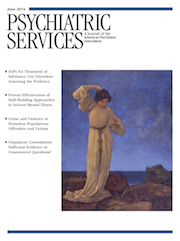This Month’s Highlights
Two AEB Series Reviews
This issue features two new reviews in the Assessing the Evidence Base (AEB) Series. The first found a high level of evidence for the effectiveness of intensive outpatient programs (IOPs) for individuals with substance use disorders. Dennis McCarty, Ph.D., and colleagues’ systematic review examined several randomized controlled trials (RCTs) and naturalistic analyses comparing IOPs with inpatient treatment or with residential care for substance use disorders. These studies consistently found comparable outcomes, and all studies reported reductions in substance use among IOP participants. The authors note that IOPs have at least two advantages over inpatient care— increased duration of treatment and the opportunity to treat consumers while they remain in their home environments, giving them an opportunity to practice newly learned behaviors (page Original article: 718). The second review, by D. Russell Lyman, Ph.D., and colleagues, found more than 100 RCTs and a high level of evidence for the effectiveness of skill building, an enduring evidence-based practice for people with schizophrenia and other serious mental illnesses. “The complexities of schizophrenia and other serious mental illnesses call for individually tailored, multimodal skill-building approaches in combination with other treatments,” the authors concluded (page Original article: 727). The SAMHSA-funded AEB Series provides updates of research on 13 commonly used interventions for people with serious mental illnesses.
Victimization in Homeless Populations
Some estimates have set the proportion of the U.S. homeless population with severe mental illness as high as 50%. Media coverage of violent incidents frequently depicts homeless individuals with severe mental illness as either victims or perpetrators of crime. Each highly publicized event unleashes a barrage of public commentary on the complex interplay between homelessness, mental illness, violence, criminal justice involvement, and victimization—often producing more heat than light. To better understand these issues and help inform evidence-based interventions, Laurence Roy, Ph.D., and colleagues undertook a systematic review of the literature on homelessness, crime, violence, and victimization. The review, which examined 21 rigorous studies, found incarceration rates ranging from 63% to 90% in this population and victimization rates ranging from 74% to 87%. The authors note that the results of their review “highlight the contrast between the magnitude of victimization and the extent of research investigating crime perpetration rather than victimization in this population” (page Original article: 739).
Preventing Depression Among Older Adults
Many older adults are reluctant to see mental health specialists, and primary care providers must be alert to signs of depression in this group. Problem-solving therapy for primary care (PST-PC), an intervention delivered by non–mental health professionals, may benefit older adults who are at risk of major depression. Charles F. Reynolds, III, M.D., and colleagues assigned patients age 50 or older with subsyndromal depression to PST-PC or to an active control group that received dietary coaching. Few patients in either group developed major depression. The authors speculated that dietary coaching’s active-coping component, as well as the social contact, may have protected against depression. Because both interventions can be delivered by non–mental health professionals—and potentially by peer providers—in primary care settings, the authors call for further research on these and other interventions to prevent depression among older adults (page Original article: 765).
Outpatient Commitment: An Ongoing Debate
Involuntary outpatient commitment remains a controversial approach to the problem of individuals with serious mental illnesses who, for a variety of reasons, fail to adhere to treatment until they require involuntary hospitalization or commit a crime and get arrested. Two Open Forums and a commentary in this issue seek some resolution to the debate. Jeffrey W. Swanson, Ph.D., and Marvin S. Swartz, M.D., assert that “the search for a definitive and generalizable randomized trial of outpatient commitment may be a quixotic quest.” They review the accumulating evidence for the effectiveness of this approach and argue that it is “time to rethink what should count as persuasive evidence that outpatient commitment works when appropriately targeted and funded” (page Original article: 808). Joseph P. Morrissey, Ph.D., and colleagues outline a strategy for “thoughtful, efficient research” meant to answer remaining questions about outpatient commitment and its alternatives, such as conditional hospital release and guardianship (page Original article: 812). In a commentary, Howard H. Goldman, M.D., Ph.D., describes “ ‘a third way’ solution to the controversy surrounding outpatient commitment—one that makes better use of existing tools without adding new coercive measures” (page Original article: 816).



